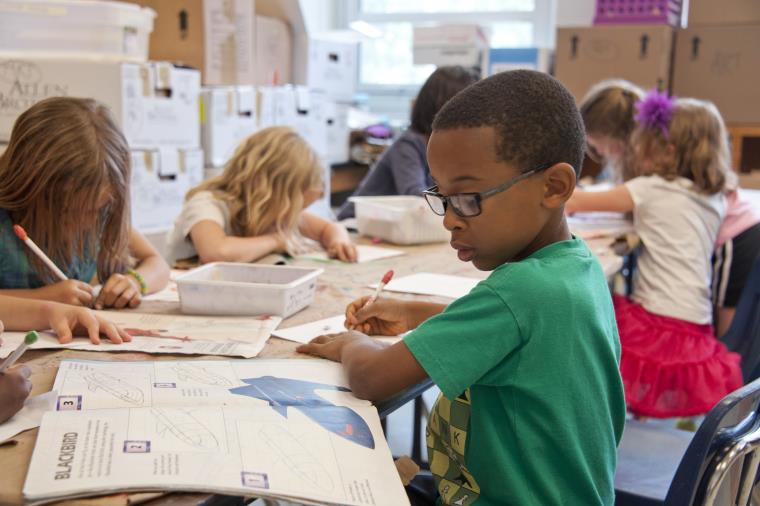Voices must be heard and policy changes made to help children become more resilient to future social shocks

Experts from the University of the West of England (UWE Bristol) are urging the Government to listen to children’s voices and make vital policy changes to improve young people’s wellbeing, resilience, and enable their understanding of challenging times.
It follows new research by a team of multi-disciplinary academics over an 18-month period, working with almost 700 children in four primary schools within socially disadvantaged areas across Bristol.
Findings from Voices in the Pandemic (VIP-CLEAR) show action must be taken to redress the impacts of future social shocks or intangible risks on children – such as the spread of other diseases, climate change, the threat of war, political change, and the cost of living crisis – but especially for those encountering pre-existing challenges who are likely to have been disproportionately disadvantaged by the Covid-19 pandemic.
The UKRI-funded research, led by Professor Lindsey McEwen, Director of the Centre for Water, Communities and Resilience at UWE Bristol, gathered and critically evaluated the worldviews, perceptions and experiences of children, aged six to 11-years-old, through a series of creative activities.
“Whilst lockdowns, social distancing, and changes in teaching delivery significantly impacted their lives, there was little attention given to their voice at this time. VIP-CLEAR sought to address this issue,” said Professor McEwen.
The VIP-CLEAR research team worked with socially-engaged artist Luci Gorell Barnes on the project. Children were asked to map their world in the first stage of research between March to June 2021. A selection of children later worked in small groups to expand on their original maps, during times when restrictions eased. Over 180 pieces of deep mapping art were created, and then analysed and discussed with the research team, school partners, an advisory board of representatives from national charity Action for Children, Family Fund and Bristol City Council’s Families in Focus, an educational psychologist and an early years’ specialist.
Professor McEwen said: “It’s clear Covid-19 stresses are overlaid with existing everyday challenges. Although children are less likely to be at risk from the virus health-wise, they have been impacted by efforts to manage the pandemic. National lockdowns and isolation periods, home learning, and social distancing measures have meant changes to contact with their family, friends, teachers, key support networks and special places. This is in addition to the understandable trauma of living through the pandemic in terms of being exposed to potential economic, social, and emotional shocks. Whilst young people have had a very wide range of experience, those encountering pre-existing challenges are likely to have suffered differently and been disproportionately disadvantaged by the pandemic.”
The researchers make policy recommendations* which scale out from the individual child and aim to improve social inequality, while also aiming for enhanced wellbeing in childhood.
The recommendations are therefore relevant to schools, community services, local government and public health teams and will be submitted to the Department of Education, the Children’s Commissioner for England, the Children All-Party Parliamentary Group and the UK Covid-19 Enquiry.
Policy recommendations
At school level
- Plan for systemic support for learning at home beyond hardware. More support is needed for parents to help their children’s learning.
- Offer children creative ways of reflecting on, and making meaning of, their experiences.
At community/neighbourhood level
- Avoid closing off play areas during government mitigation measures like lockdowns.
- As part of local urban planning, integrate pockets of green spaces for well-being and exercise within communities.
- Make it easy and cheap for children to access facilities for exercise, leisure and play outside lockdowns and in recovery.
At all scales
- Children need to be included in planning for mitigation measures and recovery processes and the information communicated to them in a way that they can access.
- Promote greater awareness of schools’ limited capacities to prop up challenged social support systems. A system change needs to happen overall as schools are currently at capacity.
- Find out about, and provide children with, opportunities to share their experiences and feelings.
- Ensure that support structures remain accessible for children and their families.
Professor McEwen added: “We wanted to ensure their worldviews and experiences are heard and considered as policy makers look to support their recovery moving forward.
“Changes need to be made to capture children’s voices and build their agency and resilience as they face other difficult and often invisible threats. We’re pleased the effect on children will now be considered in the UK Government’s forthcoming Covid-19 public inquiry, but our recommendations may significantly improve children’s experiences of future social shocks, of which there will no doubt be many. It is essential to build support out from a focus on individual children, their families, school, community and neighbourhood to national child-centred policies for recovery and renewal.”
To provide support to teachers who are often trying to tackle the issues highlighted by the research, the VIP-CLEAR team, as part of the project, has developed a free children’s book entitled ‘Learning to Live with Fog Monsters’, which is available as a learning resource for seven to 11-year olds. The book highlights the impacts of invisible threats (such as Covid-19) and its mitigation through the eyes of two 10-year-olds. The importance of sharing worries, working together, and planning for hopeful futures at home, in school and in the wider community is introduced as a springboard for classroom discussion and further work.
More information on the VIP-CLEAR project.
Related news

10 February 2026
Work by UWE Bristol lecturer features in Government’s National Cancer Plan
Work by a UWE Bristol academic has been included in the Government’s National Cancer Plan.

23 January 2026
On-demand minibus services beneficial in rural areas but face financial challenges, trials suggest
Trials of ‘demand responsive transport’ minibus services boosted connectivity for people in rural and suburban areas, according to a new report produced by UWE Bristol researchers.

18 December 2025
UWE Bristol professor appointed National Institute for Health and Care Excellence CEO
Jonathan Benger CBE, Professor of Emergency Care at UWE Bristol, has been appointed as the new chief executive officer of the National Institute for Health and Care Excellence (NICE).

17 December 2025
Findings revealed from first UK study into experiences of mothers who are survivors of rape pregnancy
UWE Bristol academics have revealed the findings of the first UK-based study of the experiences of mothers who are survivors of rape pregnancy.

11 December 2025
Social media influencer work is far more demanding than it looks, research finds
A study exploring the mental health impacts of social media influencer work has revealed that life online is far more demanding than it appears.

25 November 2025
UWE Bristol experts join film Q&A exploring music and melodrama
Academics will take part in the Cary Comes Home Festival, with a post-screening Q&A exploring music, melodrama and emotional storytelling in classic cinema.

17 November 2025
Urgent reform needed to support ambulance-delivered end of life care, study finds
More than three quarters (78 per cent) of paramedics sometimes fear doing the wrong thing when caring for people in the last year of life, new research has found.

13 November 2025
Bristol’s screen industry experiences “boom-and-bust cycle” after post-pandemic recovery, new research from UWE Bristol finds
New research from UWE Bristol provides detailed insight into Bristol's screen sector.

13 November 2025
New AI research to revolutionise animal welfare
A UWE Bristol research project will combine behavioural science and AI to create technology that understands not only what animals do, but how they feel.

10 November 2025
Lessons from Low Traffic Neighbourhoods will drive better public engagement, study finds
Lessons from Low Traffic Neighbourhoods have informed a new toolkit to improve engagement with the public on challenging local street issues.

06 November 2025
First-of-its-kind study aims to help more people spend their final days at home
A new study will explore how architectural design could support end-of-life care in domestic settings.

29 October 2025
UWE Bristol academic unveils breakthrough in energy-efficient AI at NATO science forum
Dr Jonathan Lancelot has developed a new form of AI that could transform how intelligent machines operate in space, defence, and remote environments.






